Abstract
Early childhood is an important stage in the development of a person. At this stage, a person experiences both physical and mental development. Education is very important at this stage in one’s life. During the process of mental development, education is needed in order to enhance one’s knowledge. At childhood stage, the mind is able to grasp concepts fast due to the rapid expansion. This makes it a very important stage in one’s life because it forms the basis of gathering a wide base of knowledge. Education at this childhood stage will define the ability of a person to learn about more complex concepts in life.
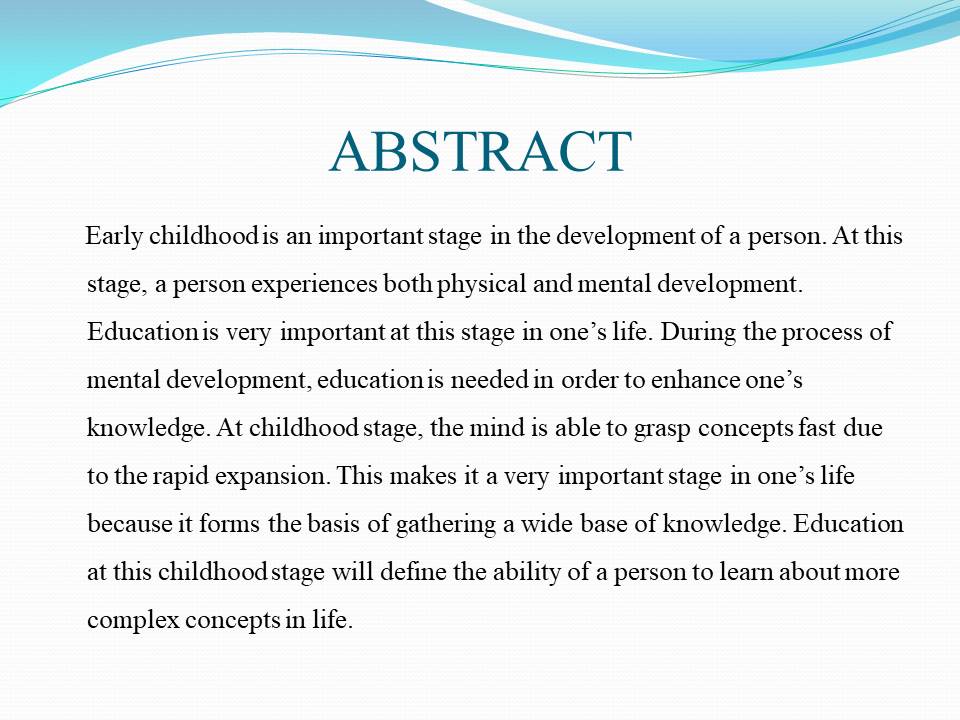
Purpose of the study
In this study, the researcher will be interested in determining why early childhood education is highly valued. The study will seek to find out why it is highly recommended for a person to start his of her education at this stage. This will help explain why governments around the world and individuals are always willing to spend a lot in order to ensure that learning at this stage is successful.
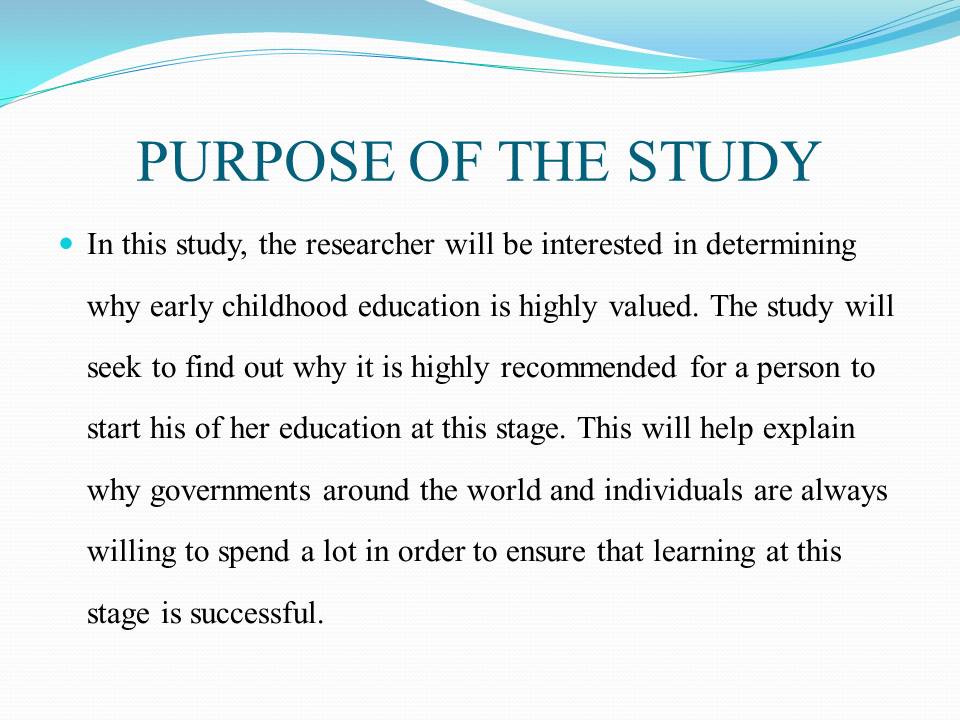
Research questions
- What is the importance of early childhood education in one’s life?
- What are some of the specific factors that make education at this stage very important?
- What type of knowledge is vital during this early stage in one’s life?
- Who are some of the stakeholders that play important roles in the early childhood education?
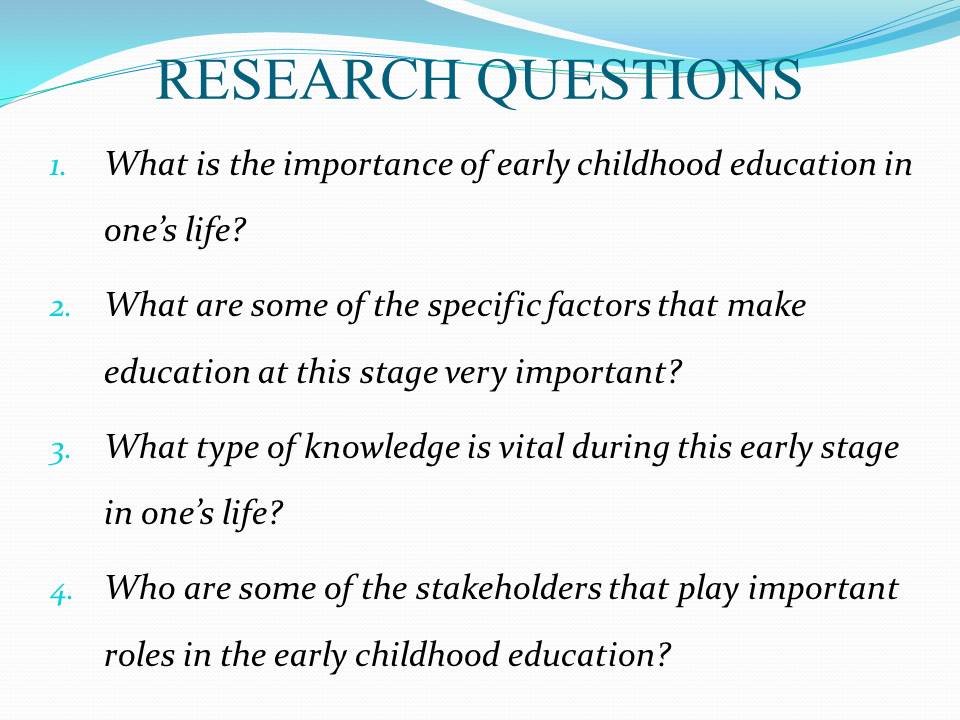
Research hypotheses
- . Education plays an essential role in a child’s mental development during the early stage of life.
- At the early childhood stage, the ability of a person to grasp concepts is always high.
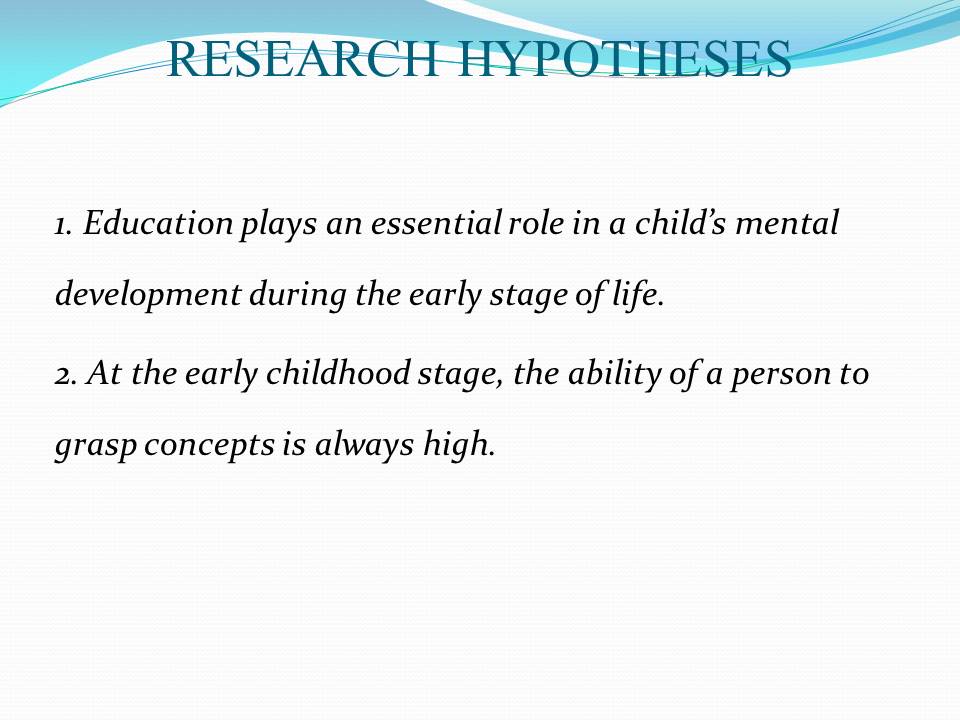
Definition of variables and key terms
Early childhood refers to a developmental stage when one is between the age of 1-4 years.
Mental development refers to the growth or expansion of the mind.
Knowledge refers to any new information gathered from different contexts that is important to a person’s normal life.
Learning
Learning refers to the gradual process of gathering knowledge by an individual in different contexts. It is important to note that learning may take the informal process where new concepts are taught to a person in a practical manner. It may also take a formal process where the concepts are passed to the learner in a classroom context. Both types of learning are very important. However, this study mainly focuses on the formal learning process.
Childhood education
Early childhood education refers to the learning process of a person who falls under the age bracket defined above. According to Heckman (2010), “Child development refers to the physical, social, intellectual, and emotional growth in young people as they interact with peers, parents, teachers, and the society.”
Passage of knowledge refers to the transfer of familiarity and mastery of new concepts about something within the society. It plays a pivotal role in the process of mental development.
Miquela (2008) defines early childhood as the pre-school years which are the stages in one’s life when a person starts developing before achieving the school going age.
Although most scholars put this age at 1-4, there is a variation among various scholars about the specific age bracket for this developmental stage.
Heckman (2010) says that early childhood learning involves passing of basic concepts to the learners so that they can develop a basis for advanced learning.
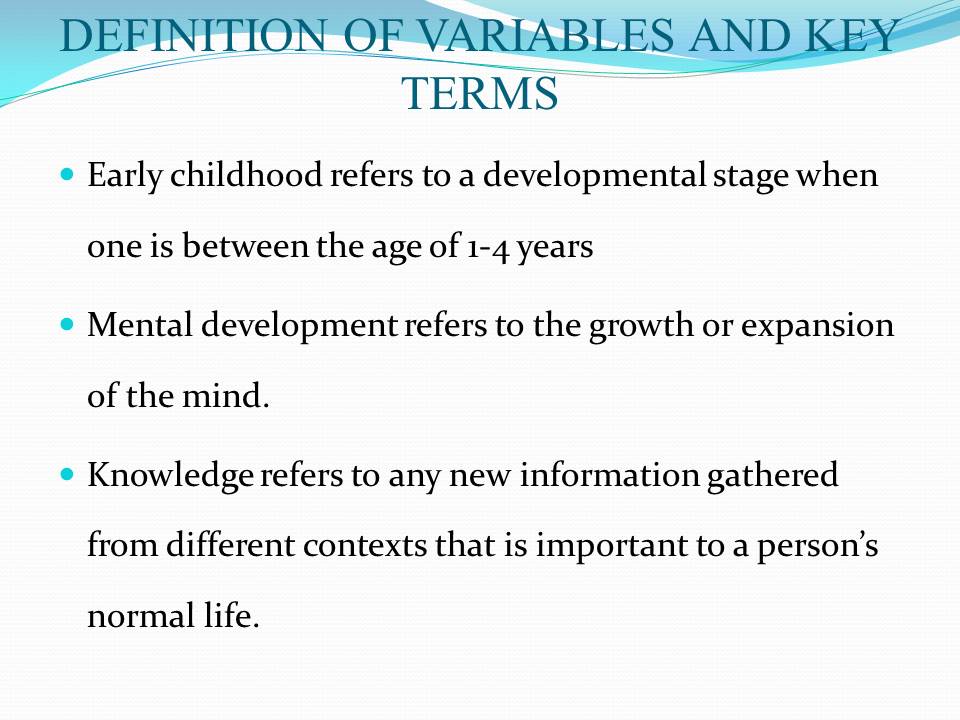
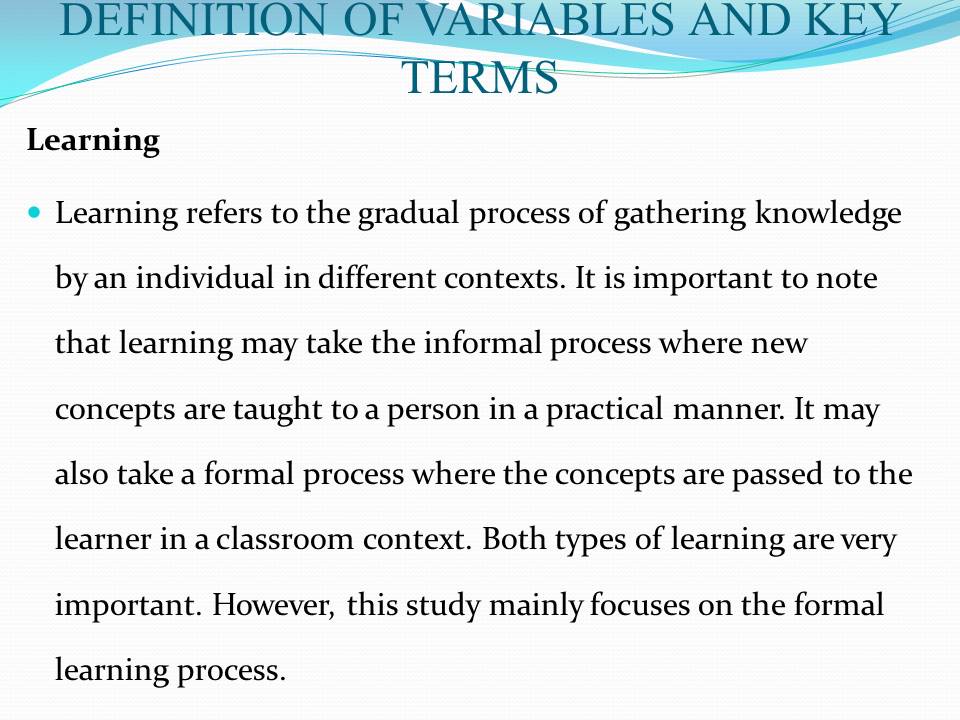
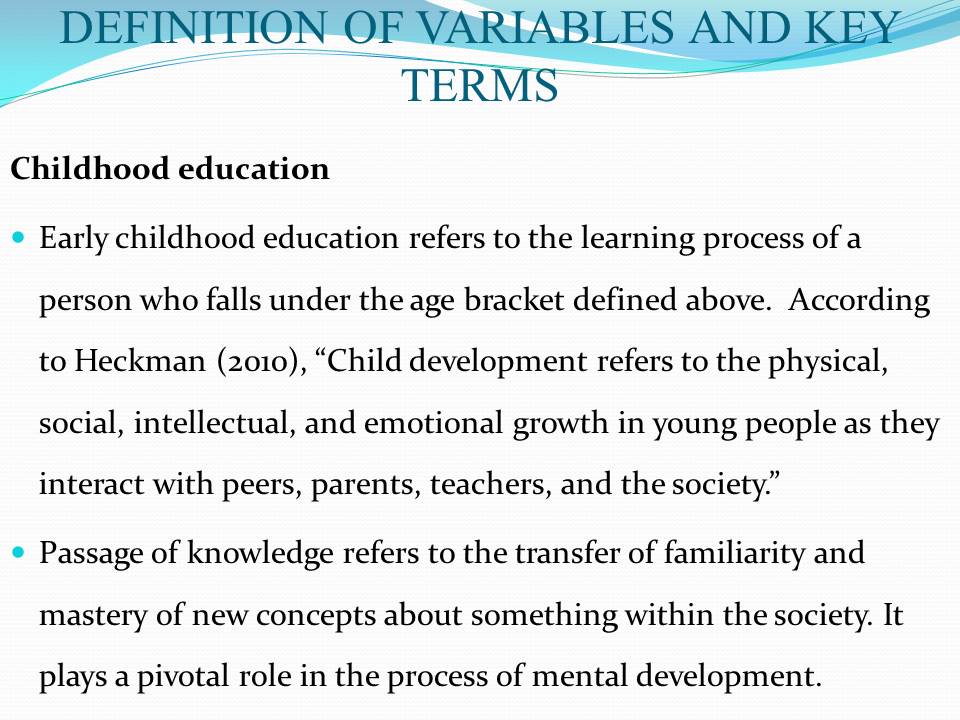
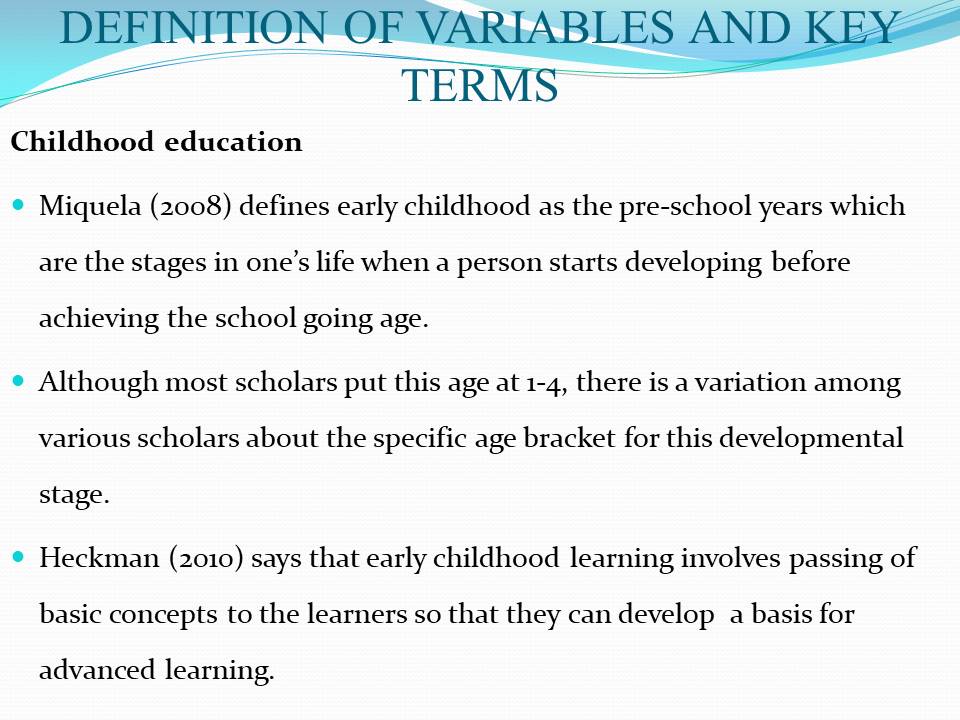
Literature review
Early childhood development
Early childhood development is an important process in the normal development of a person. It defines the kind of knowledge that forms the basis of one’s knowledge. There are a number of factors that may define the process of early childhood development. According to Miquela (2008), hereditary factors such as temperament, gender, and health status play an integral role in children’s growth, development, and relationship with others at this early developmental stage.
These hereditary factors may have either positive or negative impact on a child’s early stages of learning. Some of these factors may be changed through changing of the environmental context of the child. They include the parentage, the nature of materials that a child is exposed to, and the people it relates with in the immediate environment.
Learning arts
According to Carma, Baxter and Imes (2010), learning starts within the immediate family of the child. Heckman (2010) says that a child’s interactions with the community services such as support for parenting, quality of housing, community safety and security, social crimes, and general feeling of trust among the residents influence a child’s development.
The child starts an informal learning process that will largely impact the personality of the child at the advanced stages of development. Heckman (2010) says that children learn very fast, especially in the informal environment where they observe what is happening and how the society responds to different issues.
Brain development
Childhood development can be looked at from various perspectives. They can be classified as physical development, language development, social development, and cognitive development. Physical development of a child is very important, it includes the development of the brain to grasp more information (Heckman, 2010)
The physical development also helps a child to be more independent from the direct support by the members of the family (Carma, Baxter & Imes, 2010). This creates a perfect platform through which a child is prepared to undertake formal education away from the direct support from the parents.
Social development
At early childhood development stage, social development is very important. A child should be effectively prepared socially to undertake formal education by making it understand the ways of interacting with people in the immediate environment.
According to Carma, Baxter and Imes (2010), insufficient preparation of a child for school may have costly ineffectiveness in the education systems because of a number of reasons. The scholar associates the rising cases of school drop-outs with this insufficient preparation. When a child is not molded to understand the significance of education at an early age, chances of dropping out of school are always high. There is also the issue with discipline (Curby & Timothy, 2013).
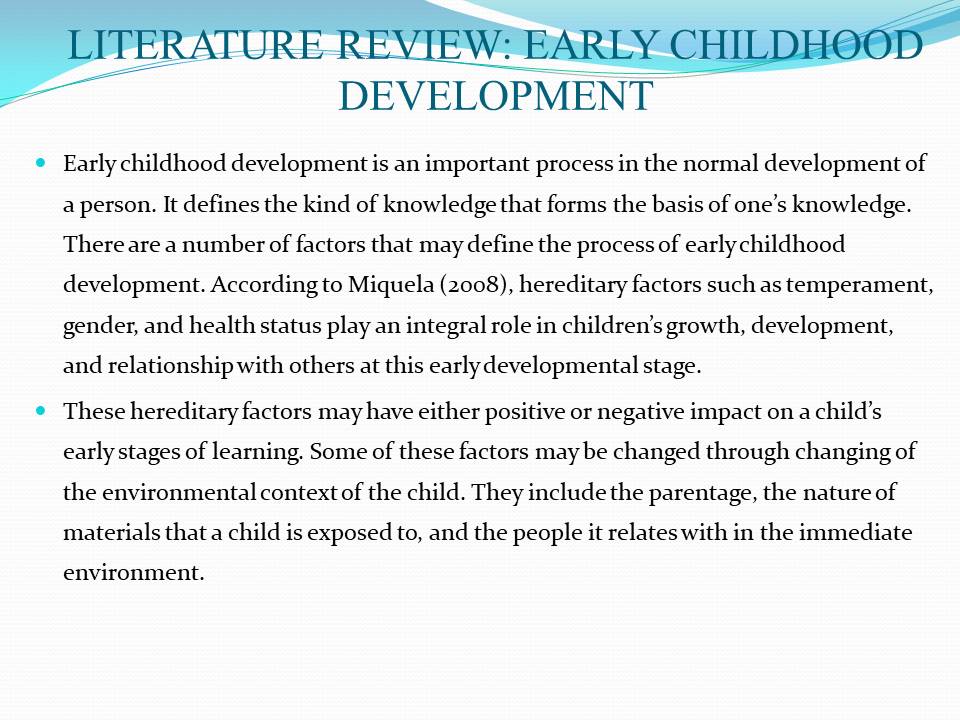
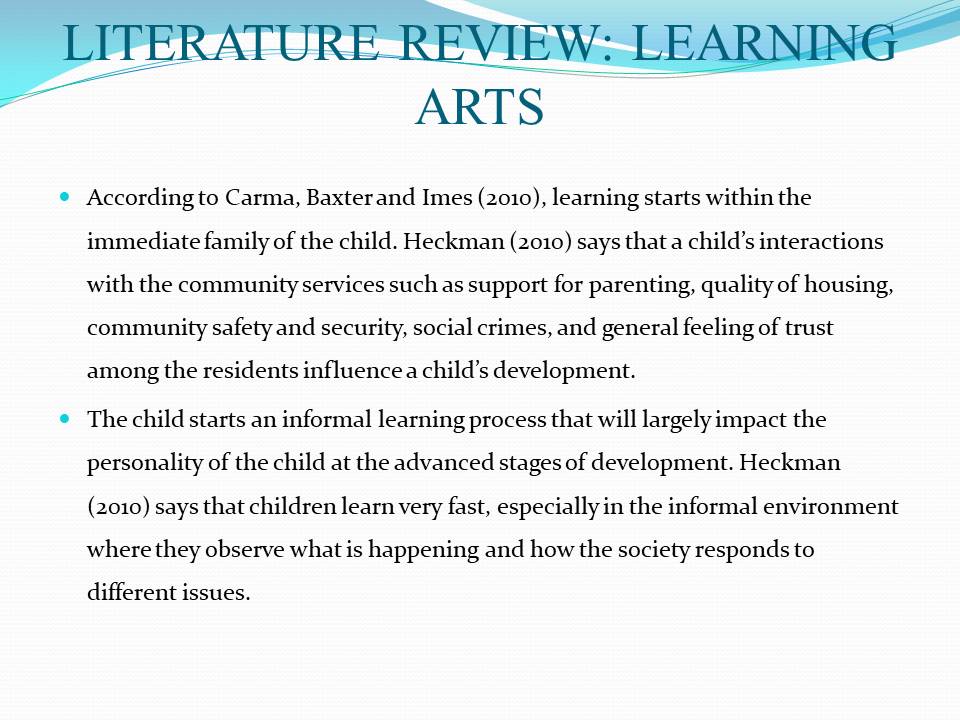
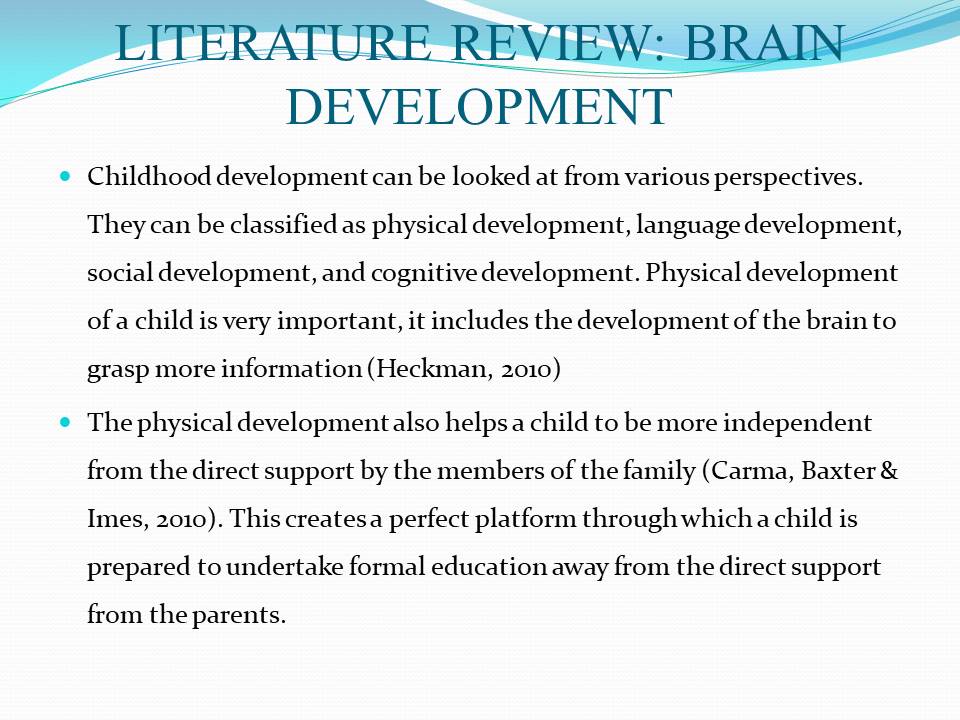
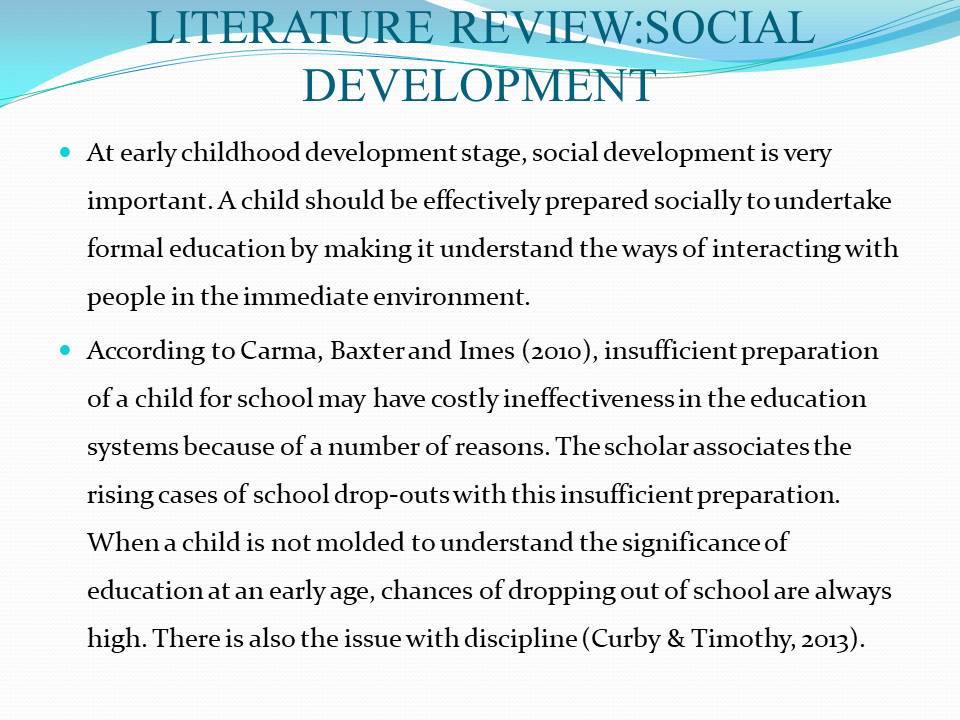
Themes from the Literature
One of the main themes coming out from this literature search is that children should be allowed to take time in learning artwork.
It is also clear that at this early stage of development, the mind always conceptualizes images faster than words because of the limited ability of a child to make cognitive or abstract reasoning.
It is during such processes that these children should be allowed to make independent decisions to expand their ability to reason. This learning process allows a child to gain self-consciousness and a sense of responsibility in life. It also allows a child to work with peers in order to jointly address a common problem in their learning process.
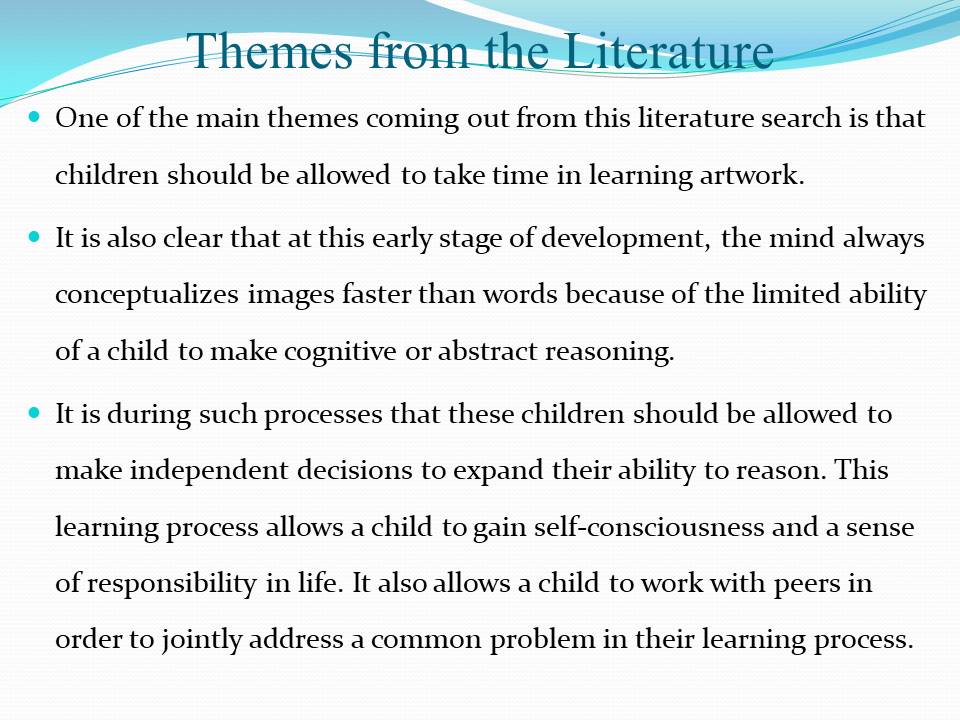
Research design
This research will involve both qualitative and quantitative research, and the researcher will participate directly in the process of data collection. The researcher will use both the structured and unstructured questions to collect primary data.
The questionnaire will be structured into four major parts. The first part of the questionnaire should capture the background information of all the respondents who participated in this study. The second section part wil deal with the demographical factors of the respondents. The third section will deal with the academic credentials and work experience of the respondents. The fourth part will delve into specific issues on early childhood education.
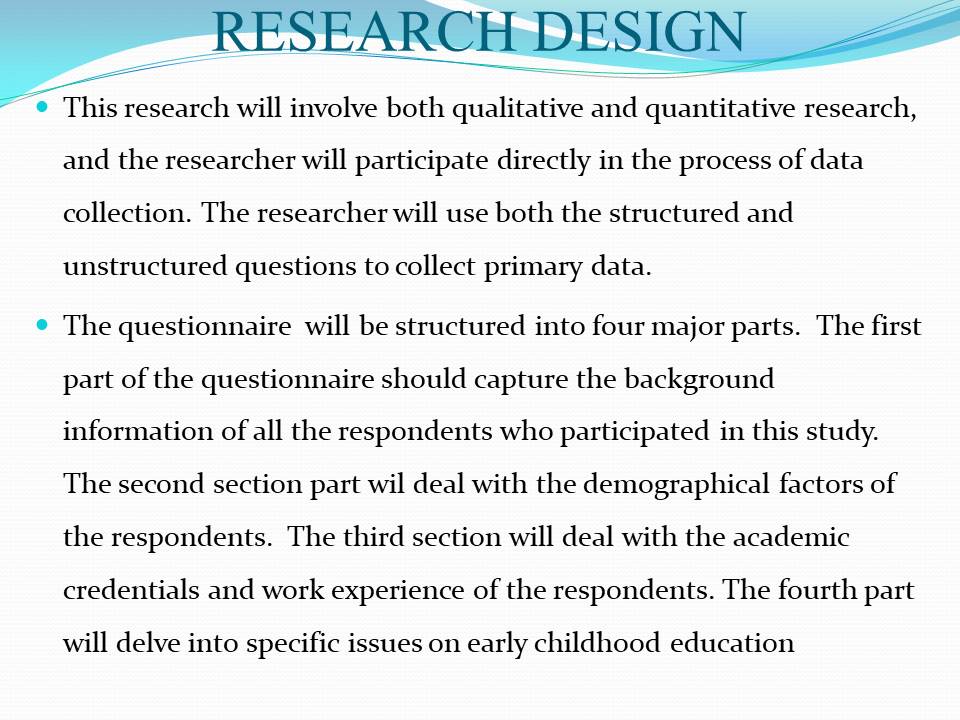
Sampling
Based on the required sample size, the arrangements of meetings and the availability of the target population, the researcher will interview parents and players in the educational sector.
The researcher feels that the more interviews, the better the results. However, the time for conducting this research will limit the number of interviews that will be carried out. In order to capture the participants in various major categories, stratified sampling approach will be used. In the first strata we have parents. The second strata will be for teachers and the third will be experts. Participants from each of the three strata will be chosen through simple random sampling.
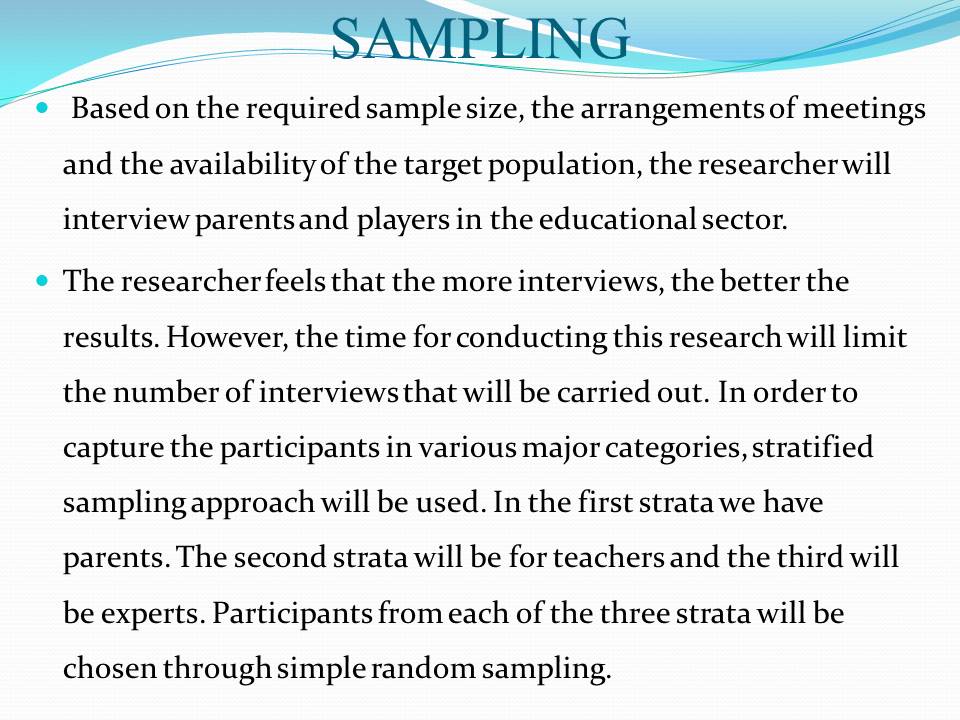
Methods of data collection
The researcher will use the secondary sources of data to define the theoretical perspective of this research. The information given by the secondary sources will capture the topic under varying environmental factors and countries. The secondary sources of data will be collected from books, journal articles and other reliable online sources.
The primary data will be taken from the parents, teachers, and other experts in the field of early childhood education.
The researcher will ask the participants about a number of issues relating to early childhood education. Although secondary data was collected from literatures that focused on various countries, the process of collecting the primary data will be restricted to Panama because of the nature of the research.
However, this does not mean that it would not be appropriate to apply the information from the primary data on a global context. The development pattern of children may vary based on a number of social environmental factors such as living standards, access to social amenities, and healthcare services.
The difference in these social factors may influence the developmental pattern of a child.
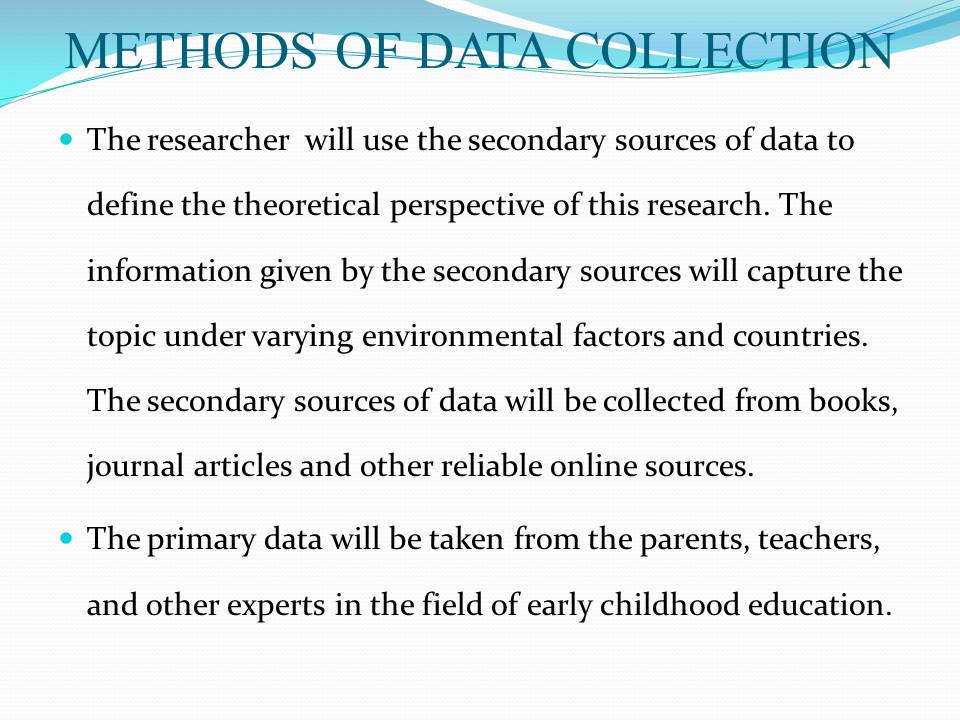
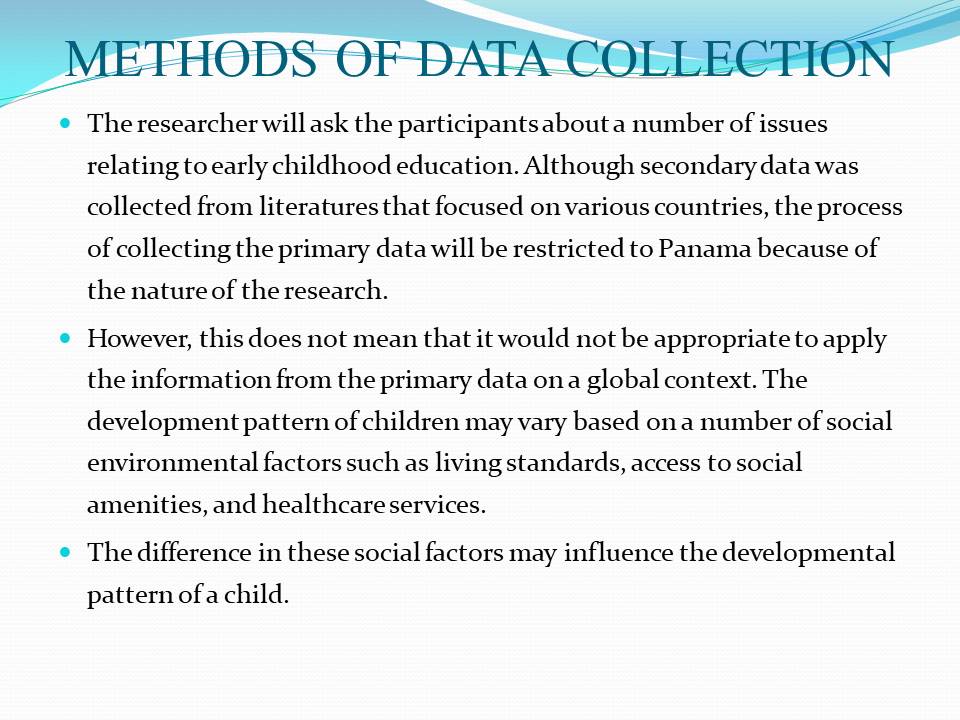
Data analysis procedures
This research will take both qualitative and quantitative approach. Depending on the type and accuracy needed, data analysis can take a simple descriptive form, or a more complex statistical inferencing.
In selecting the appropriate method, a researcher should ensure that the assumptions relating to the method are satisfied.
In analyzing the collected data, the researcher will use appropriate statistical data analysis tools such as descriptive and inferential statistics in analyzing quantitative data.
The researcher will code and enter the quantitative data into the Statistical Package for Social Sciences. Using SPSS, the researcher will then generate the results from the spreadsheet to make interpretations of the issues under investigation.
The researcher will use tables, figures, and charts to present the findings of the study. The use of tables, figures, and charts makes it easy to interpret the content of the report and make comparisons with what was found in secondary data.
This study will use both qualitative and quantitative research methods. The researcher does not anticipate varying responses because of the nature of the research topic. However, in case such variations occur, the responses will be classified.
Each class will be assigned a value that can be analyzed using mathematical tools. Qualitative research may also need the classifications in order to explain how the views of the respondents vary. This will be determined after collecting the primary data from the participants.
Qualitative method was traditionally used in social science and will be appropriate in this research. Qualitative methods explain why a given pattern of events has taken place the way it has. On the other hand, quantitative methods explain what and when of a given phenomena.
Ethnographic research and phenomenology as approaches of qualitative research will be needed. Ethnography will help in the investigation of culture of the society in Panama. Phenomenology will help to investigate the realities of early childhood education. However, because the process may not empirically support the hypotheses put forward to help guide the research, it will be used together with the quantitative research methods.
Using the two types of data analysis methods will help have a holistic view of the research topic. The phenomenology will help give a detailed description of why some factors are not taking the conventional patterns that are expected as stated in the secondary sources.
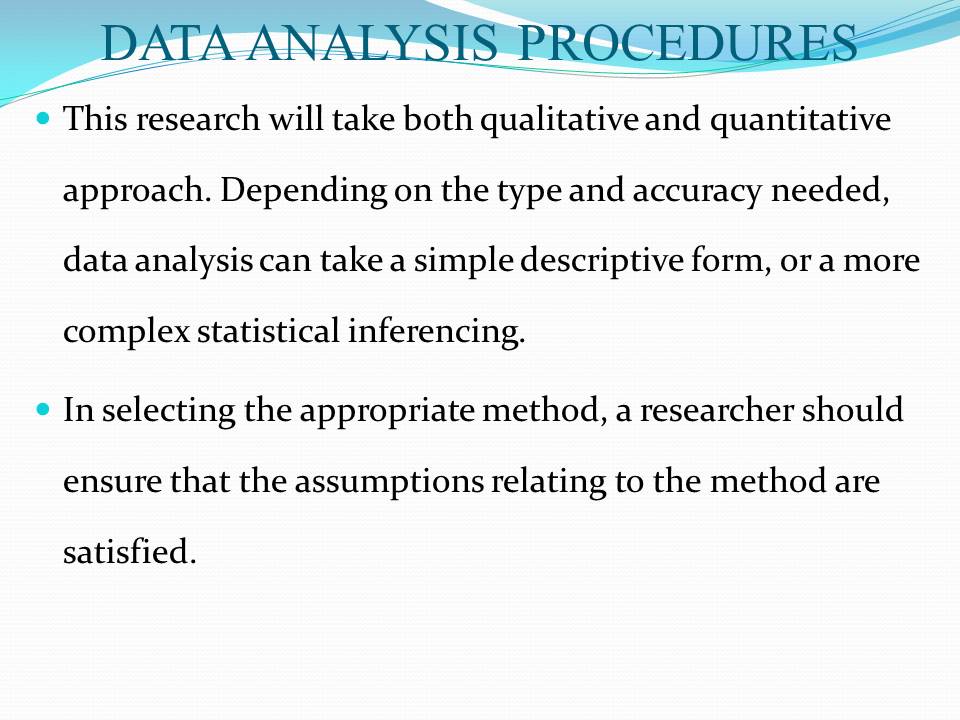
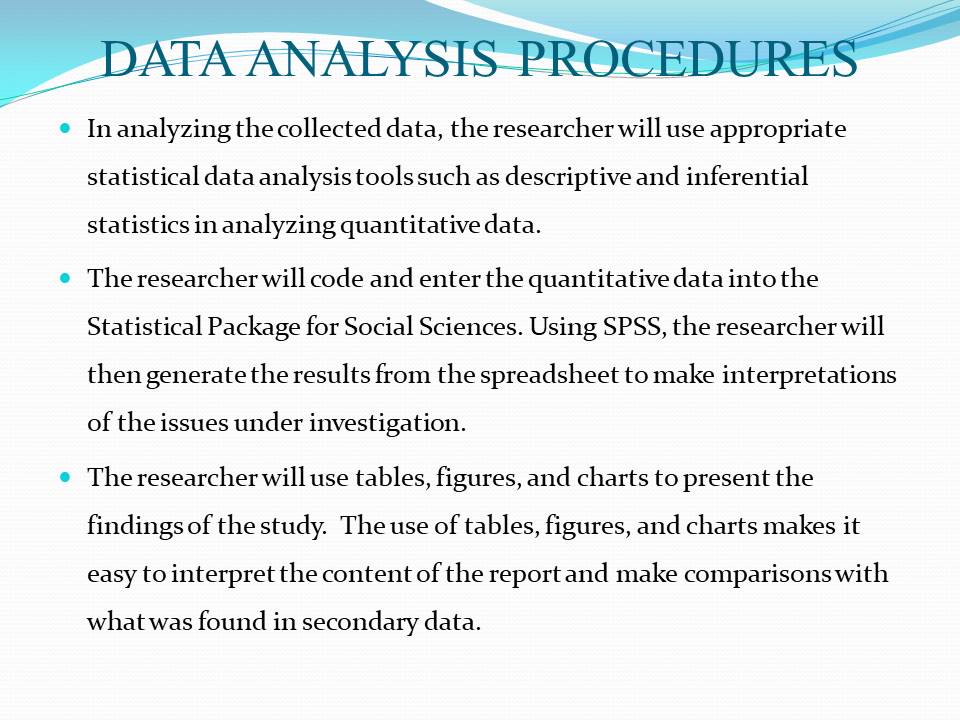
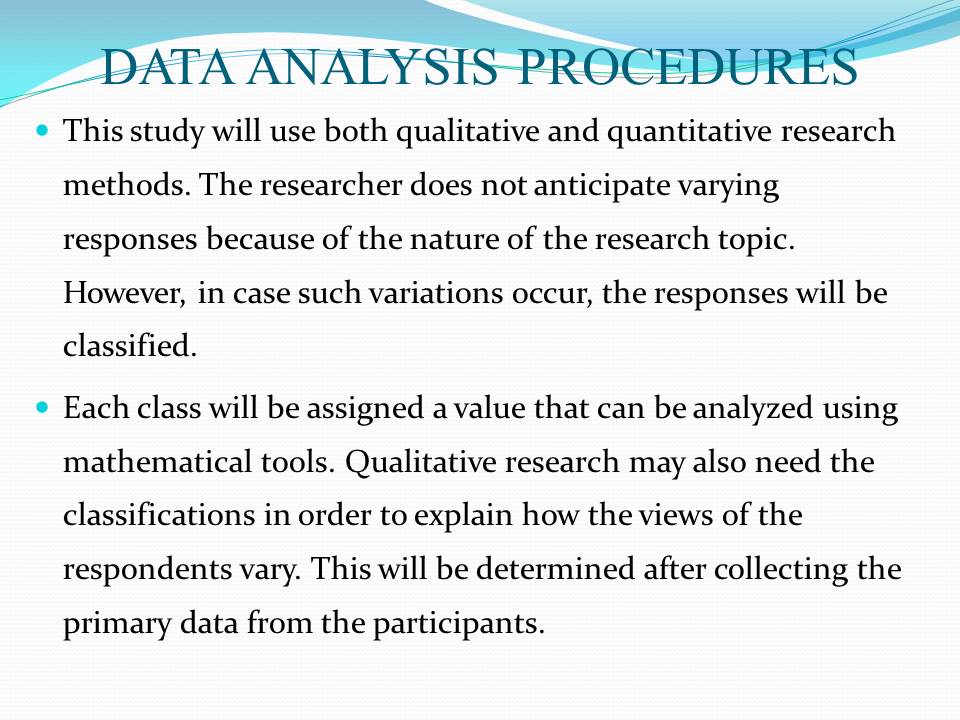
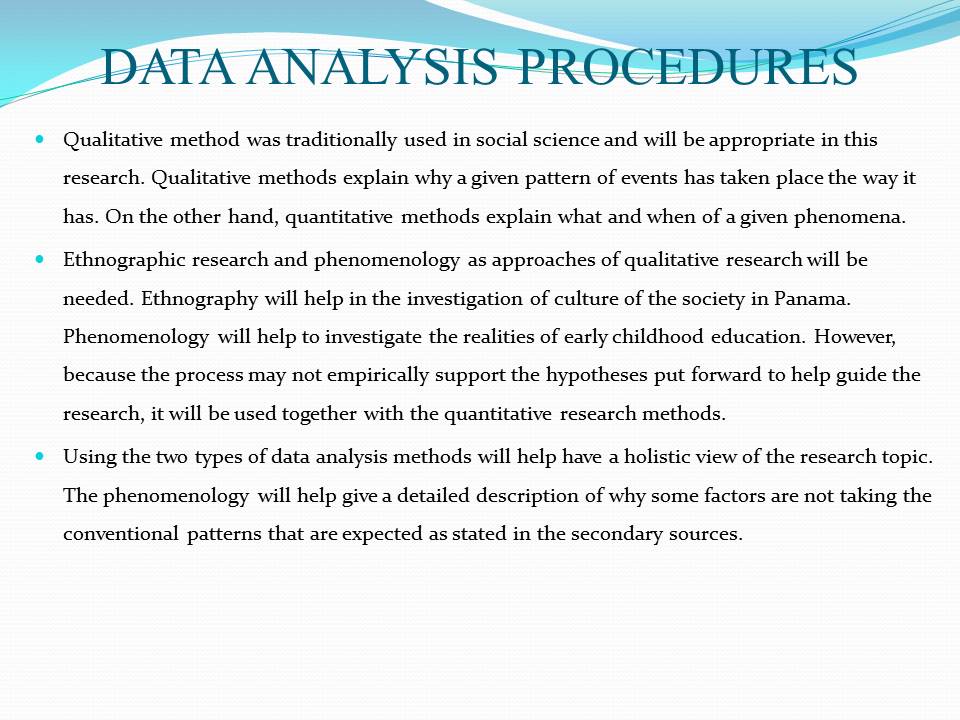
Ethics and human relations
Ethical considerations and human relations are important issues when conducting a research. In this study, it will be important to contact the participants before sending them the questionnaires. It is ethical to inform the participants of the intended research, and its importance to the researcher. This makes them prepared to take part in the study.
The participants should know why their responses are needed when explaining to them the importance of the study. They will also be informed about the protection of their identity, especially if they feel uncomfortable answering some questions.
Many people speak freely when they know that their statements will not cause consequences such as victimization. For this reason, it is expected that many of them will be willing to participate in the study if they are informed that their identity will not be revealed.
It is important to maintain a close relationship with the selected participants in order to collect quality data. According to Vogt (2007), participants in a research always give better responses when a friendship is developed between them and the researcher.
This is an ethical requirement that must be fulfilled in this study. The researcher will explain to them that this research is specifically meant for academic purposes. Other than the researcher, it will only be the lecturer who will have the access to the report.
The identity of the participants will further be protected by allowing them to use codes other than their names to eliminate any chances of their identity ever being revealed at any stage.
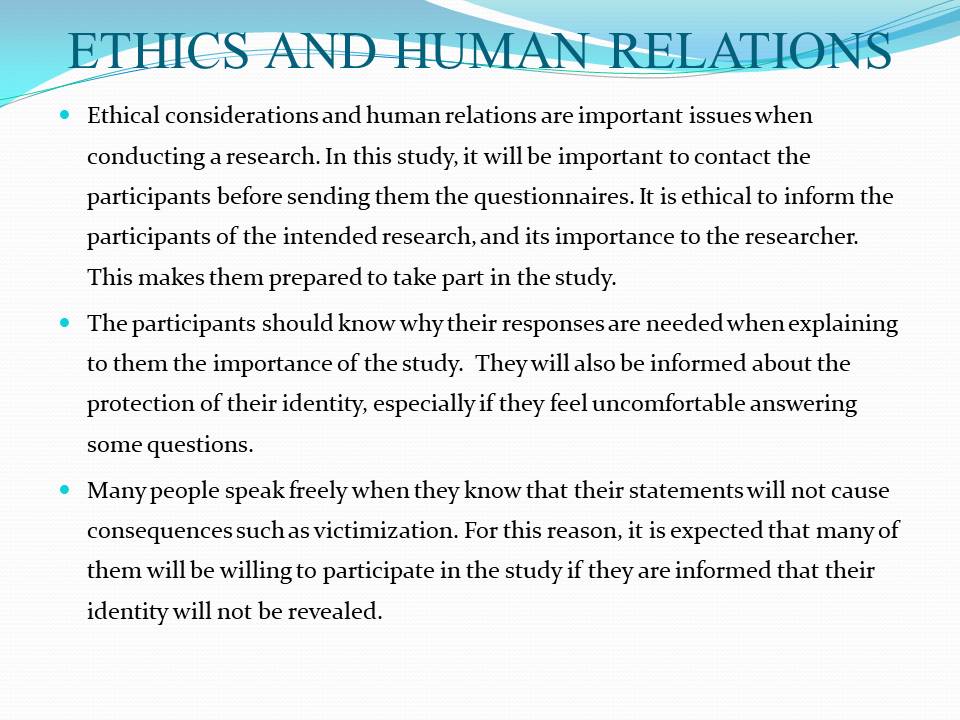
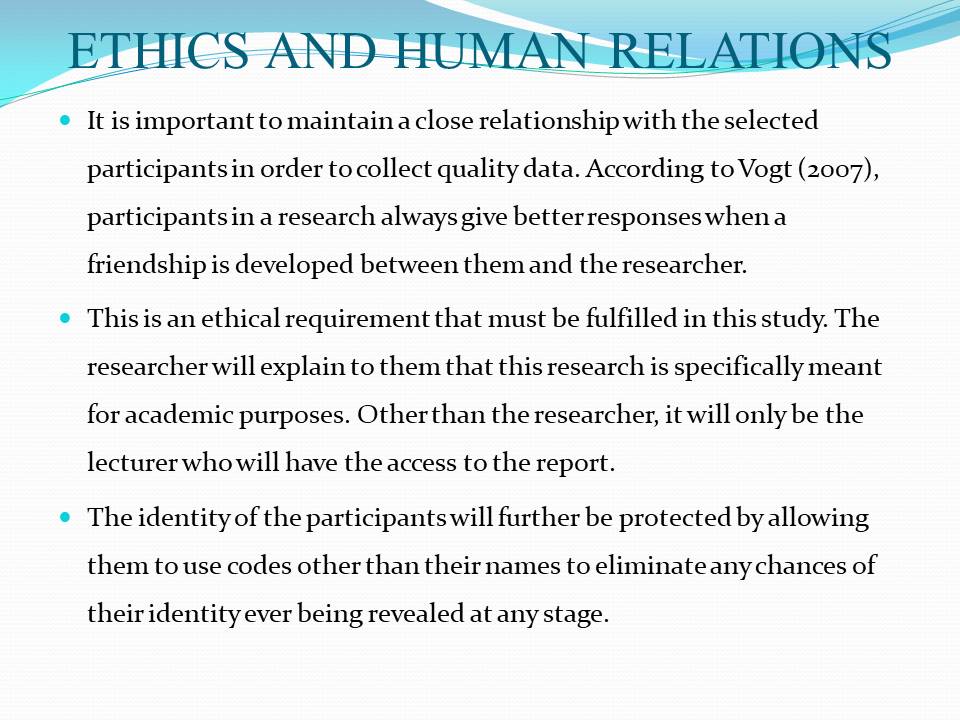
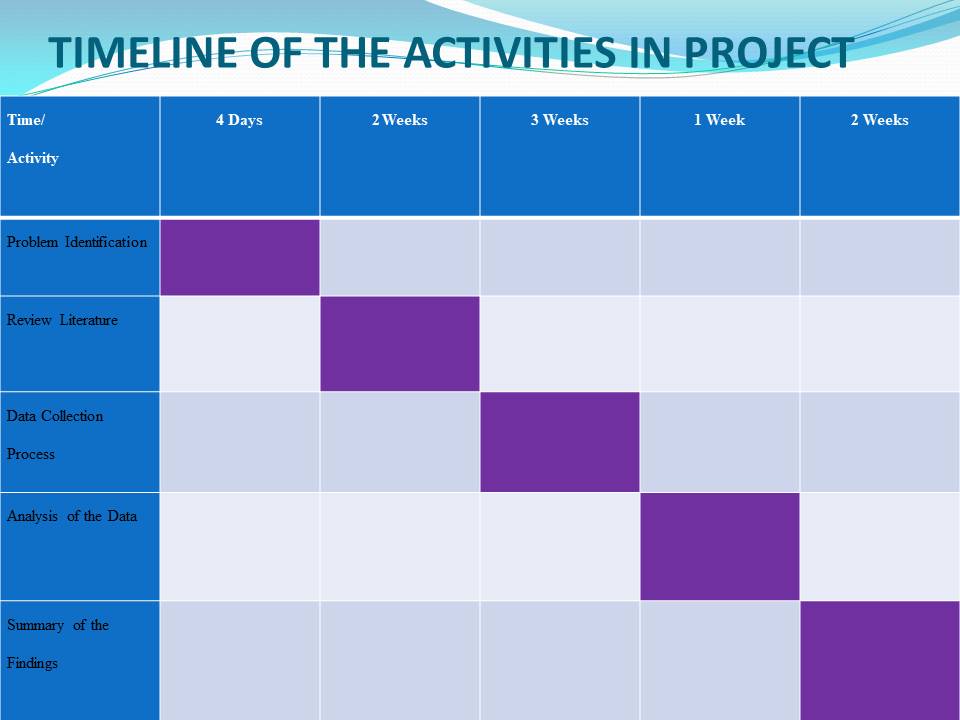
References
Carma, L., Baxter, L., & Imes, W. (2010). Parental rule socialization for preventive health and adolescent rule compliance. Journal of Family Relations, 59(1), 1-13.
Curby, W.T. & Timothy, L., L. (2013). Teachers’ emotional consistency matters for preschool children. Early Education and Development, 24(1), 292-309.
Heckman, J. J. (2010b). A new cost-benefit and rate of return analysis for the Perry Preschool Program a summary. Cambridge, Mass.: National Bureau of Economic Research.
Miquela, R. (2008). The importance of quality early childhood education. Education digest: Essential Readings Condensed for Quick Review, 74(3), 61-63.
Vogt, P. (2007). Quantitative Research Methods for Professionals Author. New York: Pearson.
Wamia, G. (2005). Quantitative methods in research. Lanham: University Press of America.